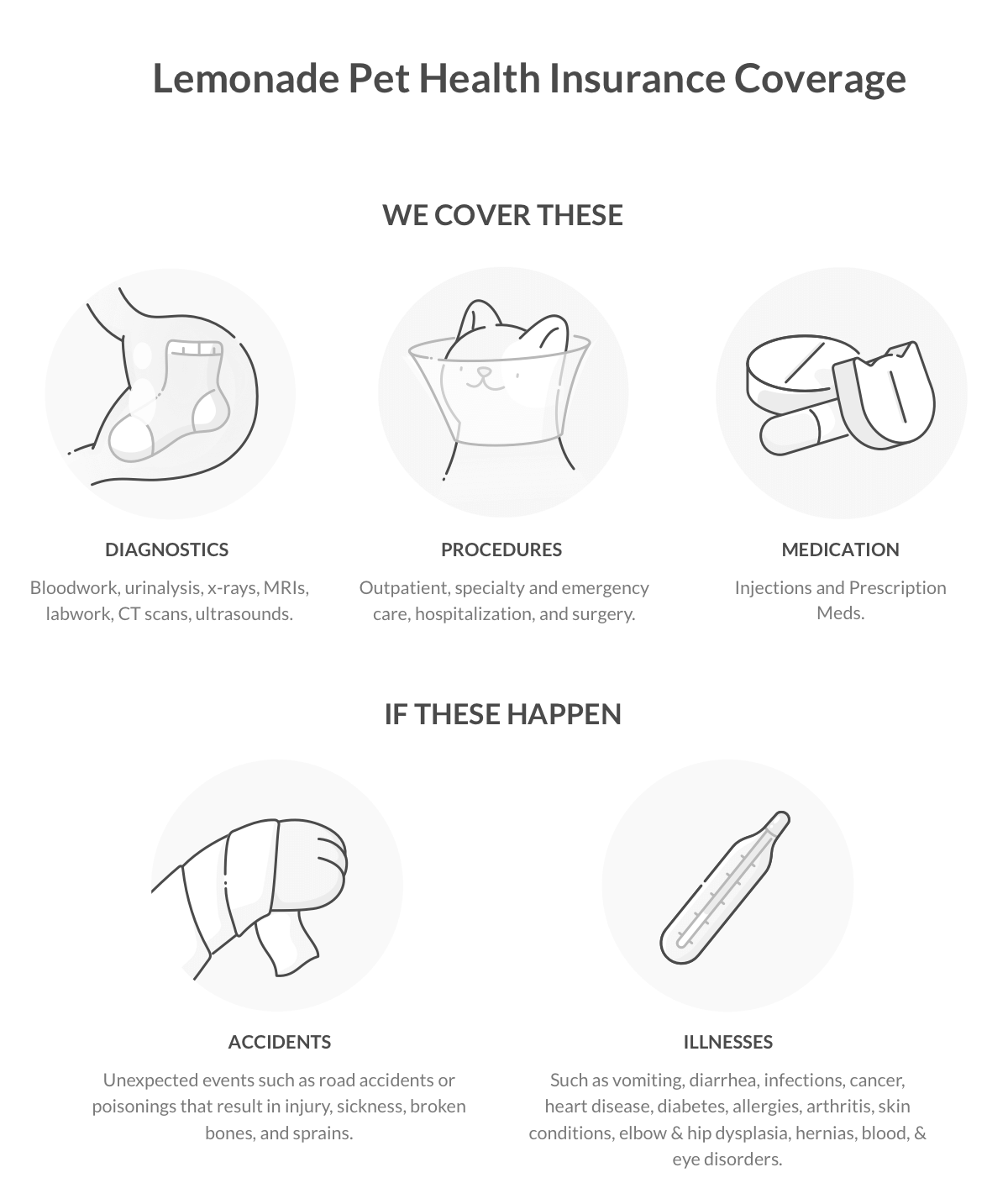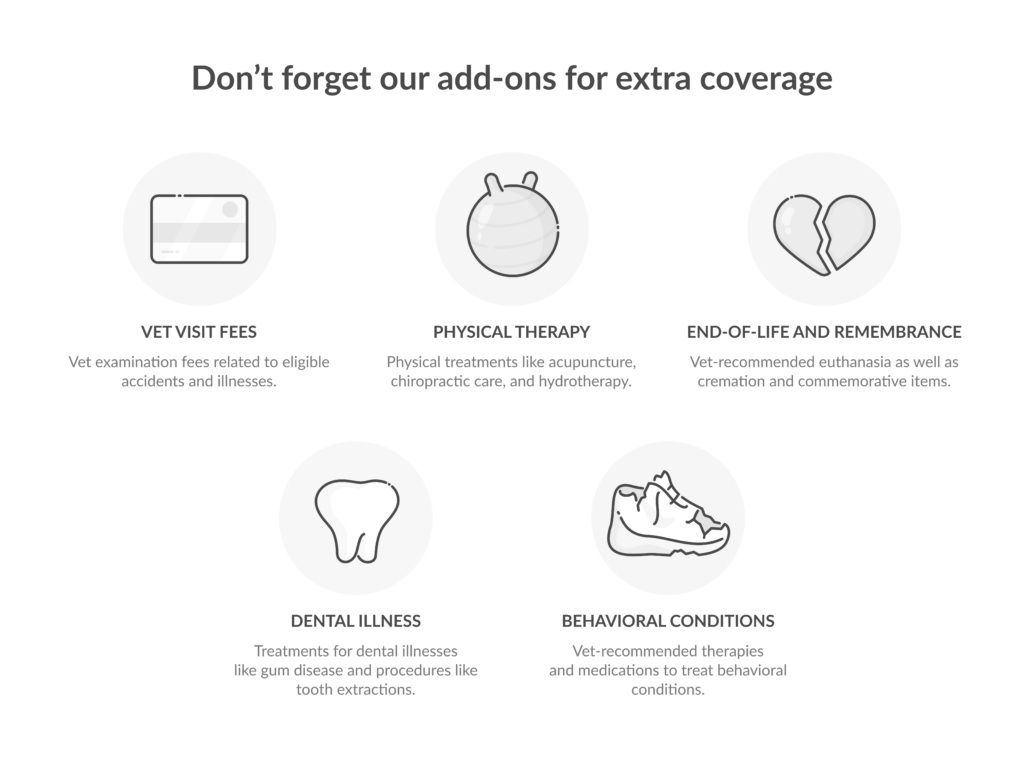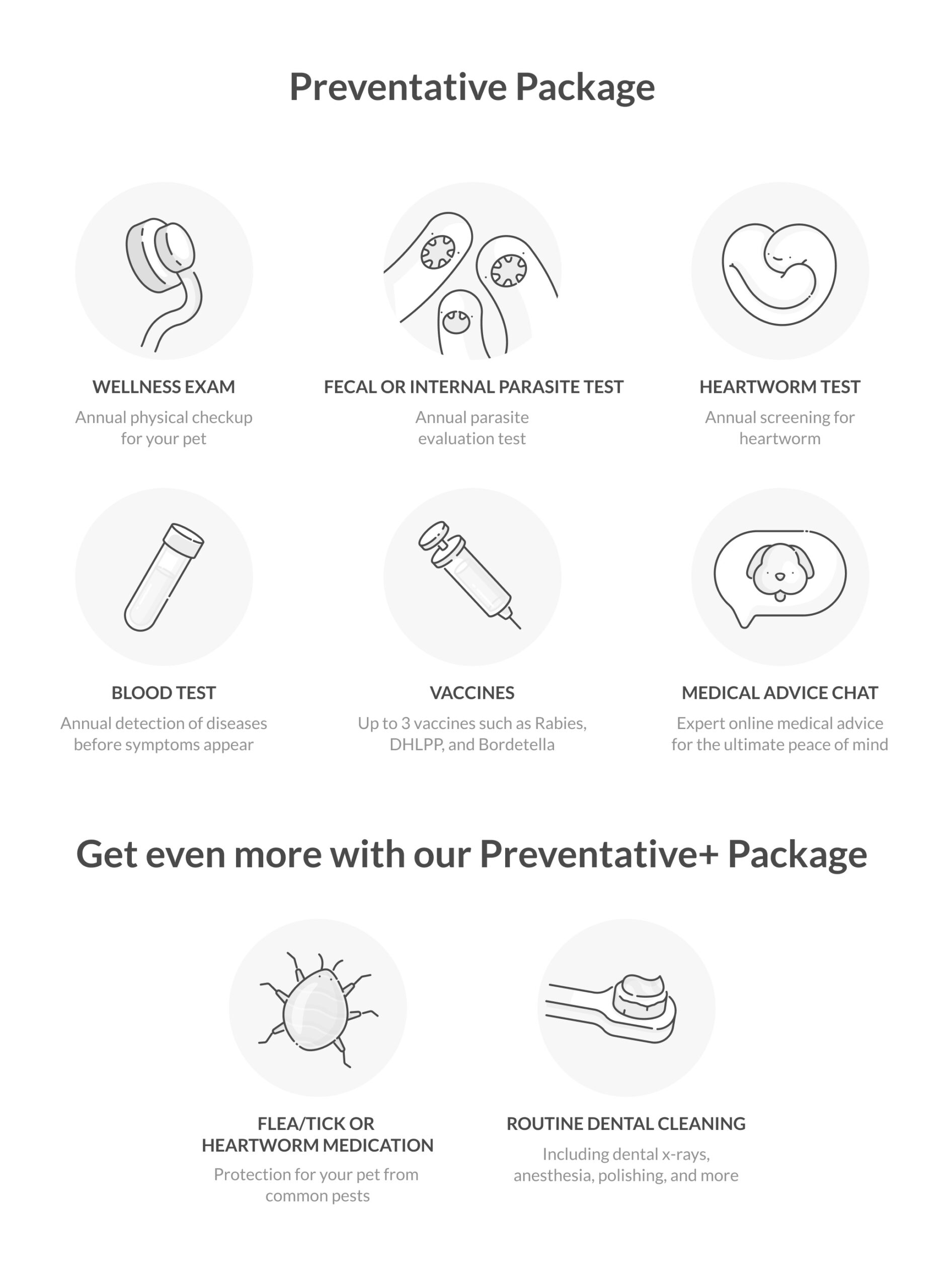Sharing your life with a cat or dog is magical. But as with any loved one, sometimes things can go wrong. Having pet health insurance doesn’t make an illness or accident disappear, but it does soften the financial blow—and make it easier to provide the best veterinary care for your pet without money being the deciding factor.
At its simplest, Lemonade pet health insurance provides coverage for your pet’s treatments and medical care if they get sick or hurt. The base policy helps out with veterinary bills for diagnostics and treatments related to accidents and illnesses (provided those occur after your policy’s waiting period has ended).
Okay, we know thinking about this stuff gets a little heavy! The thing about insurance is that you hope you never have to use it. But if you do, your furry friend will certainly appreciate the safety net you gave them.
- A base pet insurance plan with Lemonade will cover medical expenses related to accidents or illnesses.
- Pre-existing conditions won’t be covered by a pet insurance policy.
- Treatments for illnesses that develop after you purchase a policy will probably be covered by pet insurance.
- Lemonade offers five add-ons, for vet visit fees, physical therapy, dental illness, behavioral conditions, and end-of-life and remembrance.
- Lemonade offers multiple Preventative Care packages, which cover non-emergency medical care for your pet.
Let’s dig into what a pet health insurance policy covers, as well as what extra add-ons Lemonade offers to improve your pet’s medical care.
Here’s what we’ll go over:
- Does pet health insurance cover diagnostics?
- Will pet health insurance cover vet bills after an accident?
- Does pet health insurance cover cancer treatments?
- What sort of illnesses are covered by my pet health insurance policy?
- Does pet health insurance cover hospitalization?
- What are Lemonade Pet Insurance add-ons?
- Does pet insurance cover my pet’s allergy medications like Cytopoint and Apoquel?
- Are vet visit fees covered?
- Am I covered for my pet’s physical therapy?
- What about pre-existing conditions?
- Does pet health insurance cover arthritis?
- What does pet health insurance not cover?
If you’re short on time, here’s a handy cheat-sheet on Lemonade Pet Insurance coverages:
| Treatment | Usually covered | Sometimes covered | Never covered |
|---|---|---|---|
| Diagnostics | √ | ||
| Injury from accident | √ | ||
| Cancer | √ | ||
| Pre-existing conditions | √ | ||
| Dental cleaning | √ | ||
| Vaccinations | √ | ||
| Flea & heartworm prevention | √ | ||
| Flea & heartworm treatment | √ | ||
| Allergy medicine (like Cytopoint and Apoquel) | √ | ||
| Physical therapy | √ | ||
| Arthritis medication | √ |
Does pet health insurance cover diagnostics?
Yes! A Lemonade base policy will cover many of the things that vets use to keep your pup or kitty healthy. That includes blood tests, urinalysis, X-rays, MRIs, labwork, CT scans, and ultrasounds. Lemonade also offers a Preventative and Preventative+ care packages, which includes things like an annual fecal and blood test and a heartworm or FeLV/FIV test.
If my pet is involved in an accident, will pet health insurance cover my vet bills?
Your insurance policy will come in handy if your pet gets a broken bone or is hurt by a car, or if they accidentally eat toxic foods or something dangerous they shouldn’t have. (This is provided that you’re past the 2-day accident waiting period; if the accident happens within the 48-hour span after you get your policy, it, unfortunately, won’t be covered.) Lemonade’s accident and illness policy covers diagnostics (like exams or x rays), procedures (like surgery or stitches), and medication (like antibiotics or painkillers) if your dog or cat gets into an accident or comes down with an illness.
Your pet health insurance covers surgery that might result if your dog or cat ingests a toy. The only exception here is if your pet has a history of eating similar toys multiple times in the past. Being a good pet parent means watching out for your fur fam! If your cat chows down on a box of laundry detergent one day, and the vet manages to save her—that’s reason to celebrate. But it’s your responsibility after that to make sure your loved one isn’t able to get into that detergent.
Does pet health insurance cover cancer treatments?
The Big C is one of the toughest challenges a pet can face, so it’s good to know that cancer treatments are indeed covered by your pet’s health insurance policy.
If your cat or dog is diagnosed while they have a Lemonade policy, treatments like chemotherapy will be covered—just not experimental treatments. Your policy also helps pay for diagnostic tests. If there’s a suspicious lump that you want to have checked out by your vet, your policy will cover things like cytology, needle aspiration, or biopsy (for eligible conditions). But remember, the biggest factor is that you can’t wait until after a cancer diagnosis to purchase a pet health insurance policy. The key is in planning ahead.
What sort of illnesses are covered by my pet health insurance policy?
Your pet health insurance policy will cover a wide range of things, from ear infections to diabetes. You’ll also have coverage for a range of hereditary and congenital conditions, from elbow and hip dysplasia to hernias and eye disorders.
But it’s important to note that many of these may fall under the category of pre-existing conditions. If your pet is diagnosed with such conditions—like cancer or diabetes—after their pet health insurance policy’s waiting period, they’ll be covered. But if they suffer from those conditions, or show signs of them, before getting pet health insurance, treatment related to those specific conditions will not be covered.
TL;DR: The best thing you can do is get your furry friend covered with pet health insurance when they’re young, and keep them covered as they age.
Does pet health insurance cover hospitalization?
It does! Overnight visits at the vet can get pricey quick, and we’ll help cover those costs (provided they relate to an eligible condition). We’ll cover you for veterinarian recommended hospitalization, fluids, medications, and additional testing. We’ll even cover the costs for follow-up exams if you opt for our vet visit fees add-on.
Okay, okay, tell me more about pet insurance add-ons…
Wow, glad you asked! Lemonade Pet currently offers five optional add-ons that you can mix and match on your policy. Here’s what they can help cover:
- Vet visit fees. Fees vets might charge for their time and labor when you bring your pet in after an accident or illness.
- Physical therapy. Physical therapy, acupuncture, and hydrotherapy to help your pooch through the recovery process.
- Dental illness. Procedures like tooth extractions and root canals, and treatments for things like gingivitis and periodontal disease.
- Behavioral conditions. Vet-recommended therapy and medications for behavioral conditions like anxiety and aggression.
- End of life and remembrance. Vet-recommended euthanasia, as well as cremation, and commemorative items to memorialize your pet.
Are allergy medications like Apoquel and Cytopoint covered?
Yup. As long as the allergy isn’t considered a pre-existing condition, your pet’s allergy meds, like Apoquel allergy pills and Cytopoint allergy injections, are covered.
However, if your pet has been diagnosed with an allergy, or had a test that showed signs of an allergy or sensitivity before they’re covered with pet insurance, their allergy would be considered a pre-existing condition, and would therefore not be covered.
Are vet visit fees covered?
That depends. Your base Lemonade accident & illness policy won’t cover this. However, you can opt for a vet visit fee add-on, which covers your vet’s time and labor when you bring your pet for treatment.
Does pet health insurance cover physical therapy?
That depends. Your base policy won’t cover this. But if you added our physical therapy add-on to your policy, physical therapies will be covered. For example, this could be applied to a cruciate ligament repair. (That’s a scary sounding term for a common knee injury that dogs can suffer.)Our base policy does cover you for the cost of a cruciate ligament repair… but without the physical therapy add-on, we can’t help with any costs for physical therapy.
Does pet health insurance cover pre-existing conditions?
The short answer here is: Unfortunately not.
But that doesn’t mean pet insurance companies will deny coverage for your pet if they have an ailment like cancer or hip dysplasia before applying. It just means that the plan you get won’t cover costs that are directly related to the condition they had been diagnosed with before you signed them up. So while treatment for diabetes resulting from obesity is covered under a basic policy, you’ll only be reimbursed for eligible costs if your pet started showing signs of diabetes after your policy was already active.
This is one reason that pet health insurance companies require that you submit recent medical records while applying for a policy. If you want a whole lot more info about pre-existing conditions, we’ve got you.
Are there other coverage packages I can add on to my pet insurance policy?
There sure are.
You can add the basic Preventative package to your base policy to cover things you’re probably already paying for towards your pet’s ongoing care, like your pet’s annual wellness exam, three important vaccinations—for example Rabies, DHLPP, and Bordetella., in addition to a heartworm test, and a blood and fecal test.
Our Preventative+ package includes all of that, plus more tests, vaccines, routine dental cleaning, plus flea and heartworm prevention.
If you get the Puppy/Kitten Preventative Package, this extended coverage will help set your new pet up for life by covering things like spaying or neutering and microchipping.
And to top it all off, you can add our vet visit fee and physical therapy add-ons to help you pay for expensive treatments and trips to the vet.
Will my pet’s health insurance policy cover their arthritis?
If your pet has shown signs consistent with arthritis before you get a Lemonade policy, this will be considered a pre-existing condition—and therefore not covered. But if your pet develops arthritis while they have a health insurance policy, they will be covered. That’s yet another reason why it pays to get your cat or dog signed up when they’re young!
What will your policy cover if arthritis is found while your pet has a policy? We’ll help with medications, including injectables like Adequan. Your plan will also chip in for supplements, as long as they’re not herbal products, like CBD. (Sorry, California kitties.)
What are a few things that my pet health insurance won’t cover?
This is a great question, and one that we’ve covered in its own article. You should know that pet health insurance won’t cover the cost of grooming—even though your good boy certainly deserves to be pampered every now and then. The policy also won’t cover things like prescription diet food or elective cosmetic procedures.
Why should I get pet health insurance?
Because you love your cat or dog, and don’t want to bankrupt yourself to keep them healthy if they get hurt or sick! Not to freak you out, but vet bills and exam fees can creep up quickly after an illness or emergency. Cancer treatment that includes chemotherapy can run up to $35,000; even diabetes medication can cost you $1,200 a year.
Having pet medical insurance ensures that you and your furry friend can rest a little bit easier, even when life gets tough.
Which states currently offer pet health insurance?
Alabama, Arizona, Arkansas, California, Colorado, Connecticut, Florida, Georgia, Illinois, Indiana, Iowa, Maryland, Massachusetts, Michigan, Mississippi, Missouri, Montana, Nebraska, Nevada, New Hampshire, New Jersey, New Mexico, New York, North Carolina, North Dakota, Ohio, Oklahoma, Oregon, Pennsylvania, Rhode Island, South Carolina, Tennessee, Texas, Utah, Virginia, Washington, Washington, D.C. (not a state… yet), and Wisconsin.






